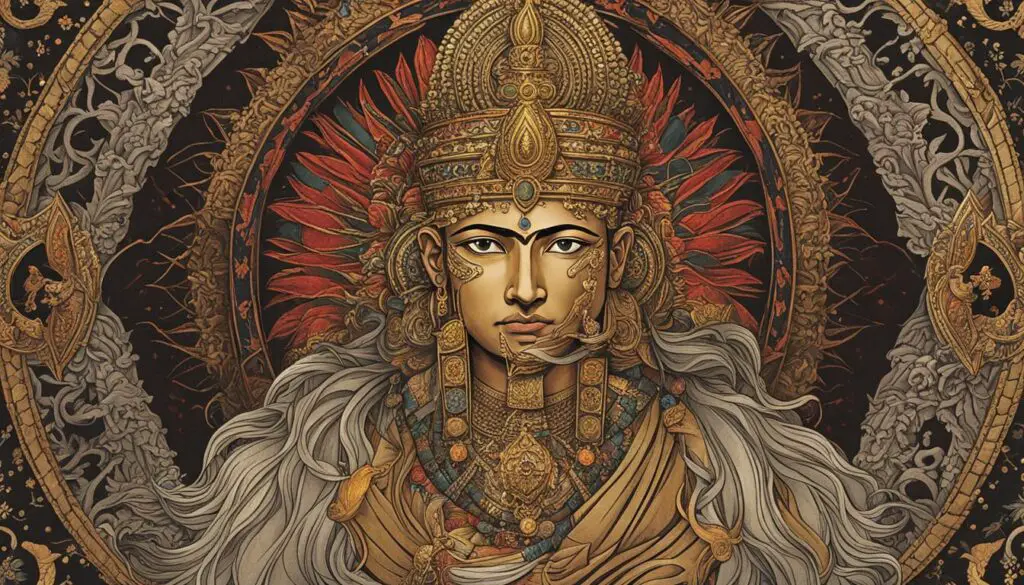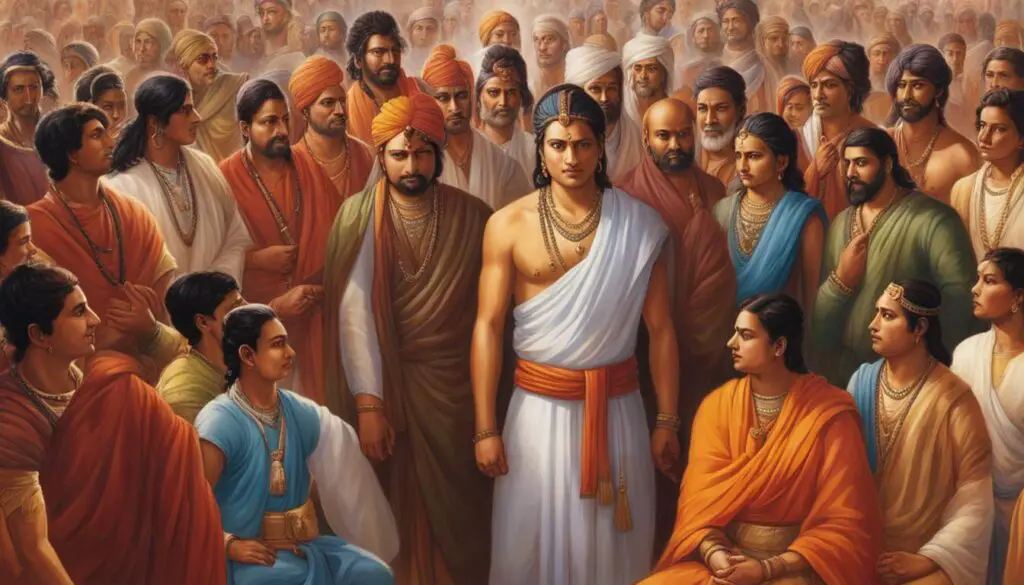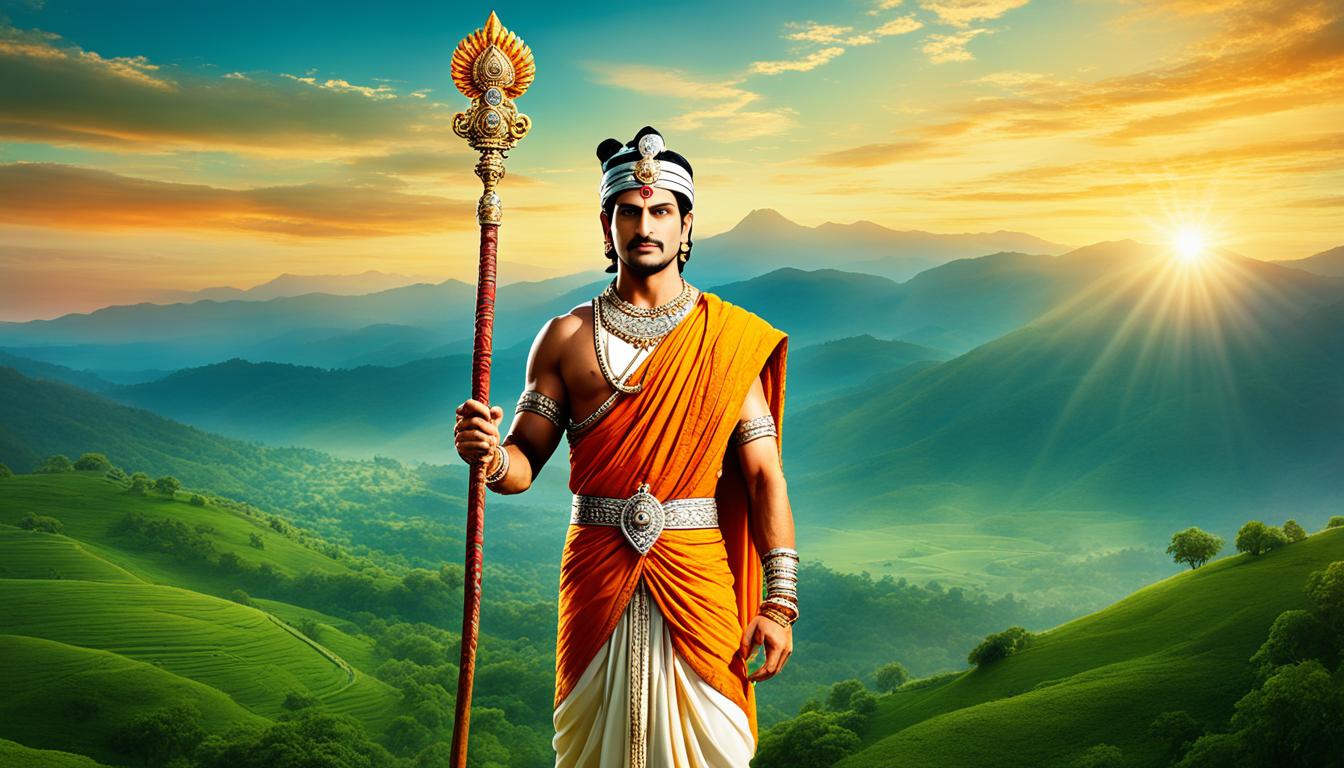Discover the extraordinary life of King Ashoka, a revered figure in ancient India’s history. Who was this enlightened ruler, and what made his reign so significant? Delve into the fascinating story of King Ashoka and uncover the lasting impact he had on the Indian subcontinent.
From his empire’s vast boundaries to his commitment to peace and religious tolerance, King Ashoka shaped ancient India in profound ways. But what lessons can we draw from this exceptional leader? Explore the transformative journey of Ashoka’s reign and gain insights into ethical leadership, personal growth, and the promotion of diversity and inclusion.
Key Takeaways:
- King Ashoka, also known as Ashoka the Great, was an enlightened ruler of ancient India.
- Ashoka’s reign marked a turning point after he witnessed the devastating consequences of war.
- He embraced Buddhism and focused on promoting peace, compassion, and social welfare.
- Ashoka’s leadership journey offers valuable lessons in ethical decision-making and personal growth.
- His promotion of diversity and inclusion serves as a crucial lesson for modern leaders.
The Transformation of Ashoka’s Reign
Ashoka’s reign witnessed a remarkable transformation that reshaped the course of his empire. This pivotal turning point in history occurred after Ashoka experienced the devastating consequences of war during the brutal conquest of the Kalinga country. The sheer magnitude of suffering inflicted on the defeated people deeply moved him, stirring a profound change within his leadership approach.
Feeling a profound sense of remorse and empathy, Ashoka renounced his previous path of armed conquests and embraced Buddhism, embodying the principles of peace and compassion. This transformative decision had a profound impact on his reign and the welfare of his subjects. Through his reign, Ashoka advocated for the ideals of dharma, emphasizing righteous conduct and the well-being of his people.
The adoption of Buddhism as the guiding philosophy of his rule marked a paradigm shift in Ashoka’s reign. It steered him towards a remarkable focus on social welfare and the betterment of his empire. Ashoka’s transformation paved the way for a reign defined by peace, compassion, and tolerance, bringing about an era of harmony and prosperity in ancient India.
“If there is among you an individual who is devoted to spreading kindness, compassion, and peace, that individual is truly taking after me”
Ashoka’s Peaceful Policies
Ashoka’s transformation fueled the implementation of policies that prioritized peace and compassion above all else. Under his reign, the empire flourished as Ashoka’s commitment to social welfare delivered lasting benefits to his subjects. He implemented a series of remarkable measures that promoted the welfare of not only humans but also animals.
- Construction of hospitals and healthcare centers to provide medical assistance
- Creation of animal welfare centers to protect and care for animals
- Investments in infrastructure development to enhance communication and trade
- Establishment of a network of wells and rest houses for travelers
Ashoka’s reign prioritized the well-being and prosperity of his people, fostering an environment of harmony and compassion. These policies laid the foundation for a prosperous society that thrived under his enlightened rule.
Ashoka’s Legacy
The transformation of Ashoka’s reign serves as a timeless example of how leaders can undergo personal growth and change for the betterment of their people. His emphasis on peace, compassion, and social welfare continues to inspire leaders to this day.

| Peace | Compassion | Social Welfare |
|---|---|---|
| Ashoka’s policies and teachings prioritized the establishment of peace within his empire and beyond. | Ashoka’s adoption of Buddhism fostered compassion towards all living beings. | Ashoka invested in infrastructure, healthcare, and animal welfare, prioritizing the well-being of his subjects. |
Ashoka’s legacy as an enlightened ruler endures, inspiring leadership that values ethics, rejuvenation, and the pursuit of peace. His transformation remains a testament to the enduring power of compassion and the potential for positive change even in the most challenging times.
Leadership Lessons from Ashoka the Great
Ashoka the Great’s leadership journey offers valuable lessons for modern leaders. His commitment to ethical leadership and moral responsibility highlights the importance of making decisions based on principles and values. Ashoka’s personal transformation showcases the power of self-reflection and the willingness to change.
“One who treats others with respect and compassion will inspire loyalty and create a harmonious work environment.”
Leaders can embrace this lesson by fostering a culture of self-reflection, encouraging feedback, and demonstrating humility. Ashoka’s promotion of diversity and inclusion is another crucial lesson. Leaders can create an inclusive work environment that values diversity, promotes respect, and encourages open dialogue to celebrate different perspectives.
Creating an Inclusive Work Environment
To effectively implement diversity and inclusion, leaders can:
- Promote diversity by actively seeking out and hiring individuals with diverse backgrounds, experiences, and perspectives.
- Educate employees on the importance of diversity and inclusion through workshops, trainings, and open discussions.
- Encourage employees to share their unique perspectives and ideas, fostering an environment where differences are valued.
- Establish policies and practices that prevent discrimination and promote equal opportunities for all employees.
By following Ashoka’s leadership example, modern leaders can create a work environment where every individual feels valued, respected, and empowered to contribute their best.

| Lesson | Key Points |
|---|---|
| Ethical Leadership | Making decisions based on principles and values. |
| Personal Transformation | The power of self-reflection and the willingness to change. |
| Diversity and Inclusion | Promoting a work environment that values diversity, respects differences, and encourages open dialogue. |
Conclusion
King Ashoka, the enlightened ruler of ancient India, has left behind a remarkable legacy that continues to inspire leaders to this day. His reign was characterized by ethical leadership, transformation, and the promotion of diversity and inclusion. These powerful leadership lessons hold immense value for modern leaders striving to create a positive impact on individuals and society as a whole.
Ashoka’s commitment to ethical leadership serves as a guiding light for leaders who recognize the importance of making decisions based on principles and values. His personal transformation demonstrates the power of self-reflection and the willingness to embrace change. By fostering a culture of self-reflection, encouraging feedback, and demonstrating humility, leaders can follow in Ashoka’s footsteps to create a work environment that is built on trust, integrity, and compassion.
Furthermore, Ashoka’s promotion of diversity and inclusion is a timeless lesson that resonates in today’s world. Leaders can embrace the power of diversity by nurturing an inclusive work environment that values different perspectives, encourages open dialogue, and celebrates unique contributions. By fostering diversity and inclusion, leaders can unlock the full potential of their teams and cultivate an environment where innovation thrives.
King Ashoka’s legacy is a testament to the potential for personal growth, positive change, and the transformative power of compassionate leadership. As leaders draw inspiration from his enlightened rule, they have the opportunity to make a difference in the lives of their followers, just as Ashoka did for his subjects. By incorporating these invaluable leadership lessons into their own practices, leaders can create a harmonious and thriving work environment that leaves a lasting impact on individuals and society as a whole.
FAQ
Who was King Ashoka?
King Ashoka, also known as Ashoka the Great, was the third Mauryan Emperor of Magadha in the Indian subcontinent. He ruled from approximately 268 to 232 BCE.
What is Ashoka’s legacy in ancient India?
Ashoka’s reign is considered a golden age in ancient India’s history due to his promotion of peace, religious tolerance, and social welfare.
What led to the transformation of Ashoka’s reign?
Ashoka’s reign underwent a profound transformation after witnessing the devastating consequences of war during the brutal conquest of the Kalinga country.
What changes did Ashoka make after his transformation?
Ashoka renounced armed conquests, embraced Buddhism, and adopted a policy of peace and compassion. He promoted righteous conduct and the well-being of his subjects.
What are the leadership lessons from Ashoka the Great?
Ashoka’s commitment to ethical leadership, personal transformation, and the promotion of diversity and inclusion serve as valuable lessons for modern leaders.
How can modern leaders apply Ashoka’s lessons?
Modern leaders can foster a culture of self-reflection, encourage feedback, demonstrate humility, and create an inclusive work environment that values diversity and promotes respect.
What is King Ashoka’s lasting legacy?
King Ashoka’s legacy continues to inspire leaders to this day, showcasing the potential for personal growth, positive change, and the power of compassion in leadership.
Source Links
- https://www.britannica.com/biography/Ashoka
- https://www.linkedin.com/pulse/enlightened-ruler-ashoka-greats-leadership-legacy-lee-nallalingham-pweie
- https://en.wikipedia.org/wiki/Ashoka

